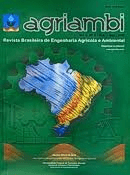
Revista Brasileira de Engenharia Agricola e Ambiental
Scope & Guideline
Empowering Global Knowledge in Agronomy and Sustainability
Introduction
Aims and Scopes
- Agricultural Engineering Innovations:
Research focusing on new technologies and methodologies in agricultural practices, including irrigation management, soil fertility, and crop production techniques. - Sustainable Agricultural Practices:
Studies aimed at promoting sustainable practices that enhance agricultural productivity while minimizing environmental impact, including the use of organic fertilizers and biostimulants. - Soil and Water Management:
Research on the management of soil and water resources, including studies on irrigation efficiency, salinity effects, and the use of alternative water sources. - Crop Physiology and Biochemistry:
Investigations into the physiological responses of crops to various stresses, such as salinity, drought, and nutrient availability, aiming to improve crop resilience and yield. - Environmental Impact Assessments:
Research assessing the environmental impacts of agricultural practices, including studies on soil erosion, nutrient runoff, and the use of agrochemicals. - Precision Agriculture:
Utilization of technology and data analysis to enhance agricultural practices, including the use of remote sensing, drones, and machine learning for crop monitoring and management.
Trending and Emerging
- Biostimulants and Organic Fertilizers:
Increasing research on the use of biostimulants and organic fertilizers highlights a trend towards sustainable agriculture, focusing on enhancing plant growth and resilience against stressors. - Climate Resilience and Adaptation Strategies:
Emerging studies are focusing on how agricultural systems can adapt to climate change, including research on drought-resistant crops and efficient water use strategies. - Smart Agriculture Technologies:
The integration of smart technologies, such as precision agriculture and machine learning, is gaining traction, with studies exploring how these innovations can optimize agricultural practices. - Salinity Management in Crop Production:
A notable increase in research on managing salinity in irrigation practices reflects the challenges posed by climate change and the need for sustainable water management. - Agroecological Practices:
There is a growing trend towards research that emphasizes agroecological principles, which aim to harmonize agricultural production with ecological sustainability.
Declining or Waning
- Traditional Soil Fertility Studies:
Research focused solely on conventional soil fertility practices is decreasing, as newer studies are integrating more complex and sustainable approaches to soil management. - General Crop Management Techniques:
General studies on crop management without specific innovations or sustainability considerations are becoming less frequent, as the focus shifts towards more specialized and technology-driven approaches. - Pesticide Efficacy Studies:
Research solely dedicated to the efficacy of chemical pesticides is declining, with a noticeable shift towards integrated pest management strategies that emphasize ecological balance.
Similar Journals
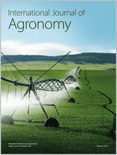
International Journal of Agronomy
Exploring the Frontiers of Agronomy and Crop ScienceIntroducing the International Journal of Agronomy, an influential publication in the field of agricultural sciences, established by HINDAWI LTD. With an impact factor that reflects its relevance and quality, this journal has been an essential resource for researchers and professionals since its shift to Open Access in 2009, facilitating widespread dissemination of knowledge. Based in the United States, the journal has achieved notable recognition within the academic community, currently ranked in the Q2 quartile among Agronomy and Crop Science, with an impressive Scopus Rank of #139 out of 406 in its category, representing the top 65th percentile. Spanning from 2013 to 2024, it aims to advance the understanding and innovation in agronomy through its rigorous peer-reviewed research articles, reviews, and case studies. With a commitment to enhancing global agricultural practices and sustainability, the International Journal of Agronomy stands as a vital platform for sharing cutting-edge findings that ultimately contribute to the advancement of the agronomic sciences.

CROP SCIENCE
Advancing sustainable agriculture through innovative research.CROP SCIENCE, published by WILEY, is a premier journal dedicated to the field of agronomy and crop science, offering a platform for high-quality research on crop production, genetics, and sustainable agricultural practices. With an impactful presence since its inception in 1974, the journal has become a significant contributor to advancing knowledge in this critical field, as evidenced by its Q2 ranking in the 2023 categorizations and a Scopus rank in the 72nd percentile among its peers. The journal's aim is to disseminate innovative research findings that inform best practices and policies for enhancing crop yield and sustainability, making it an essential resource for researchers, professionals, and students alike. Although CROP SCIENCE does not currently offer open access options, the journal’s extensive readership and reputation make it a valuable asset for anyone invested in the future of agriculture.

Journal of Tekirdag Agriculture Faculty-Tekirdag Ziraat Fakultesi Dergisi
Transforming challenges into solutions for a sustainable future.The Journal of Tekirdag Agriculture Faculty-Tekirdag Ziraat Fakultesi Dergisi, published by UNIV NAMIK KEMAL, represents a significant platform dedicated to the dissemination of research in the fields of agricultural and biological sciences. With an ISSN of 1302-7050 and E-ISSN 2146-5894, this journal aims to advance knowledge and innovation within its scope, which encompasses a diverse array of agricultural topics and environmental pollution. Notably, it has achieved a Q3 category ranking in Agricultural and Biological Sciences and a Q4 category ranking in Pollution for 2023, reflecting its growing influence in the academic community. Operating from Turkey, the journal publishes articles that seek to address contemporary challenges in agriculture and environmental science, thus fostering collaborations among researchers, professionals, and students worldwide. Researchers can benefit from the journal’s focus on applied sciences, providing insights and solutions pertinent to real-world issues. Engage with cutting-edge studies and contribute to this evolving field by exploring the transformative research featured within.
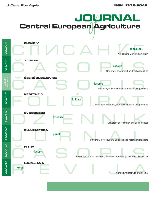
Journal of Central European Agriculture
Advancing Agricultural Knowledge Across Central EuropeThe Journal of Central European Agriculture, with ISSN 1332-9049 and E-ISSN 1332-9049, is an esteemed platform published by UNIV ZAGREB, FAC AGRICULTURE that caters to the dynamic fields of agronomy, crop science, and animal science. Since its establishment in 2000, this Open Access journal has played a crucial role in disseminating critical research findings while fostering collaboration among academics, researchers, and professionals within the agricultural community. The journal, which is based in the heart of Croatia, spans a rich history of scholarship, with its content available for free to readers and contributors alike. As reflected in its current standings, the journal has achieved a Quartile 3 ranking in Agronomy and Crop Science and Quartile 4 in Animal Science and Zoology for the year 2023, indicating its growing influence within these disciplines. With Scopus ranks placing it in the 32nd percentile among its peers, the Journal of Central European Agriculture is committed to advancing agricultural sciences not only in Central Europe but globally as it prepares for its converged years from 2007 through 2024. This journal serves as a vital resource for innovative research, practical applications, and a deeper understanding of agricultural challenges and solutions.
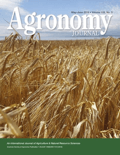
AGRONOMY JOURNAL
Leading the Way in Agronomic Knowledge and DiscoveryThe Agronomy Journal, published by Wiley, is a leading platform for cutting-edge research in the field of agronomy and crop science. Established in the United States, this prestigious journal carries the ISSN 0002-1962 and E-ISSN 1435-0645, with its coverage spanning from 1976 to 2024, showcasing a wealth of knowledge over decades. The journal is recognized in the top quartile (Q1) of its category, making it a highly respected source for quality literature, ranking #108 out of 406 in the Scopus database and reflecting a 73rd percentile standing in agricultural and biological sciences. While it operates under traditional access options, its commitment to disseminating valuable scientific inquiry aligns with the objectives of advancing sustainable agricultural practices globally. The Agronomy Journal serves as an indispensable resource for researchers, professionals, and students eager to stay abreast of significant advancements and discussions influencing the future of crop science and agronomic research.

Terra Latinoamericana
Exploring the Depths of Soil Science in Latin AmericaTerra Latinoamericana is a prominent academic journal published by the Mexican Society of Soil Science, focusing on the essential disciplines of soil science, biochemistry, and ecology. With a dedicated commitment to open access since 2014, this journal provides a platform for researchers and professionals to disseminate and access cutting-edge research aimed at understanding soil interactions, environmental pollution, and ecosystems within Latin America. The journal holds a Q4 ranking in multiple categories, including Ecology and Soil Science, reflecting its growing presence in the academic landscape and its role in fostering scholarly communication within these fields. Though currently positioned in the lower quartiles, Terra Latinoamericana presents a valuable opportunity for emerging scholars and experienced researchers alike to contribute impactful findings and engage with key issues affecting soil health and ecological sustainability in diverse environments. By promoting innovative research and collaborative dialogue, this journal continues to shape the future of soil science and related disciplines, making it an indispensable resource for the scientific community.
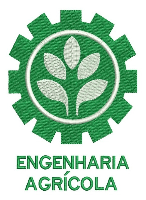
Engenharia Agricola
Bridging knowledge and practice in agricultural sciences.Engenharia Agricola, published by the SOC BRASIL ENGENHARIA AGRICOLA, is a crucial open-access journal that has been at the forefront of agricultural engineering research since its inception in 1981. With an E-ISSN of 1809-4430 and an ISSN of 0100-6916, this journal stands out in the field by providing a platform for disseminating innovative studies and advancements in agricultural practices and technologies. Based in Brazil, the journal emphasizes global perspectives in agricultural and biological sciences, currently positioned in the Q3 quartile of its category, as recognized in the 2023 Scopus Ranks, where it ranks 97 out of 193 publications. Researchers, professionals, and students can access a plethora of high-quality articles that contribute to sustainable agronomy, agricultural mechanics, and resource efficiency across various environments, with open access since 2004, ensuring that critical knowledge is readily available to all stakeholders in the field.

Revista Ciencia Agronomica
Nurturing the growth of agricultural research and innovation.Revista Ciencia Agronomica is a leading open access journal published by the Universidade Federal do Ceará, Departamento de Geociências, dedicated to advancing the field of agricultural sciences. Established in 2008, the journal has emerged as a significant platform for the dissemination of original research and innovative advancements in areas including agronomy, horticulture, and soil science, with a dedicated convergence of years extending to 2025. With an impactful presence in academic circles—ranking in Q3 for Agronomy and Crop Science and Soil Science and Q2 for Horticulture in 2023—this journal provides vital insights for researchers and practitioners alike. Although specific HIndex metrics are currently unavailable, the journal's Scopus rankings attest to its relevance, placing it in the 52nd, 44th, and 43rd percentiles across multiple pertinent categories. Since transitioning to an open access model in 2010, Revista Ciencia Agronomica has committed to maximizing the reach and impact of its published work, thereby ensuring valuable contributions to global agricultural knowledge.

Crop Forage & Turfgrass Management
Cultivating knowledge in forage and turfgrass science.Crop Forage & Turfgrass Management, published by WILEY, serves as an essential platform for researchers, professionals, and students in the fields of agronomy, crop science, plant science, and soil science. With a focus on advancing knowledge in the management of crops, forage systems, and turfgrass, this journal plays a pivotal role in disseminating innovative research and practical applications that drive agricultural sustainability and productivity. Despite its Q3 ranking in various agricultural and biological science categories according to Scopus, it aims to enhance its impact and relevance in the academic community through high-quality publications. As a journal converged from 2015 to 2024, it invites contributions that address contemporary challenges and solutions in crop management, ensuring accessibility to vital knowledge for the advancement of agricultural practices. Situated in the United States, it also reflects the diverse agricultural landscapes and practices of the region, making it a valuable resource for a global audience.
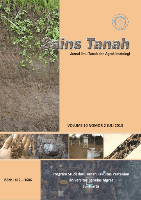
SAINS TANAH
Fostering Sustainable Practices in Soil and Crop ManagementSAINS TANAH is a renowned peer-reviewed journal that focuses on the fields of agronomy, soil science, and environmental studies, published by Universitas Sebelas Maret Surakarta in Indonesia. Established as an Open Access platform since 2001, it aims to disseminate high-quality research that addresses critical issues in soil health, crop management, and pollution, thereby fostering sustainable agricultural practices. With its current impact factor demonstrating a Category Quartile ranking of Q3 and Q4 in major areas such as Agronomy and Crop Science, Atmospheric Science, and Pollution, SAINS TANAH serves as an essential resource for researchers, professionals, and students dedicated to advancing knowledge and solutions in these vital fields. By providing a collaborative environment and upholding rigorous academic standards, the journal not only highlights the significance of Indonesian research contributions but also aims to connect local insights with global agricultural and environmental challenges.